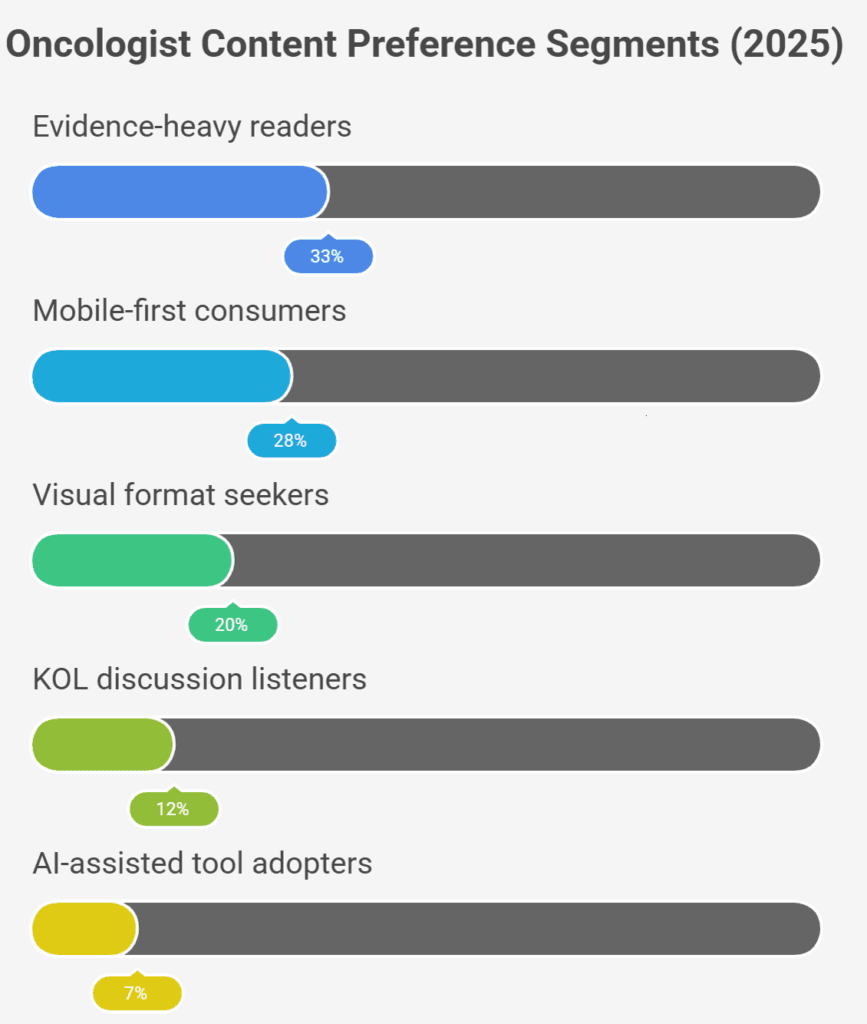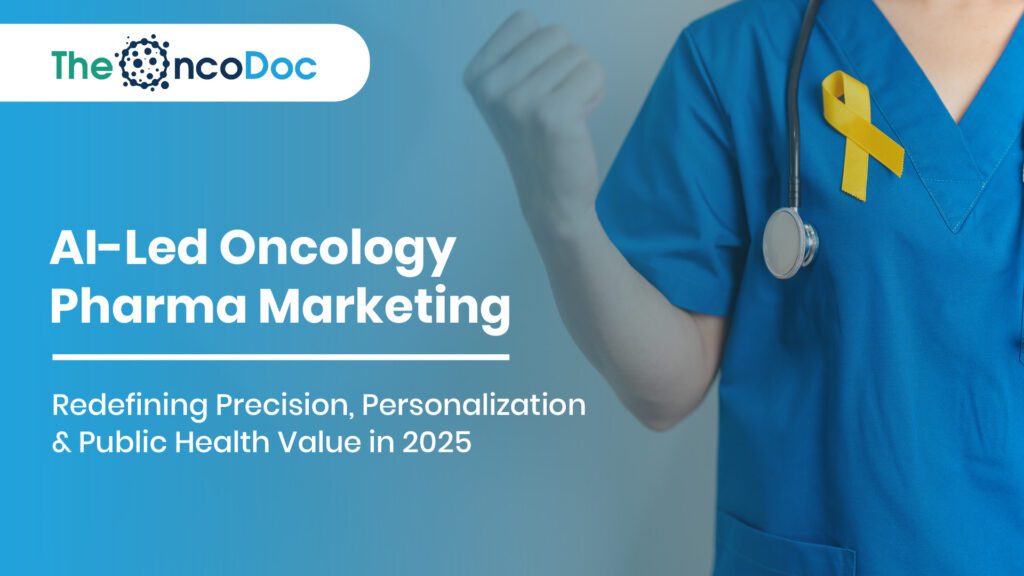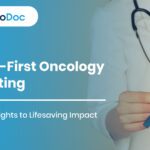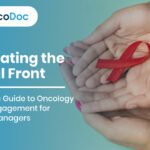Introduction: Beyond Promotion- AI as a Clinical and Societal Enabler
In 2025, oncology pharma marketing is no longer just about product promotion. It’s about meaningful engagement, decision support, and ecosystem impact. Amid the global surge in cancer incidence and complexity, AI has emerged as the connective tissue between pharma brands, oncologists, public health infrastructures, and patient lives.
Yet, despite the rise in digital tools and content, a key challenge persists: attention scarcity in an era of information overload. Oncologists, inundated with new data, need fast, clinically useful content that maps to real-world workflows. AI’s promise lies in re-engineering pharma marketing from being just persuasive to being profoundly precise, predictive, and participatory.
This article explores how forward-looking pharma teams can embed AI across the oncology marketing value chain, grounded in ethics, scaled by automation, and inspired by impact.
1. The Evolution of Oncology Marketing: From Mass Messaging to Intelligent Micro-Engagement
Traditional oncology marketing operated on a broad-stroke approach, often built around:
- Uniform slide decks with limited personalization
- Top-down, KOL-centric messaging strategies
- A focus on brand visibility over clinical utility or timing
The complex preferences and decision-making processes of busy oncologists were often ignored by this paradigm. In contrast, AI is now powering a shift toward micro-moment marketing, where every interaction is tailored to the clinician’s unique context, needs, and digital behavior patterns.
Using AI, pharma marketers can dynamically adjust:
- Content’s tone and complexity, depending on past interaction
- Channel selection (email, chatbot, WhatsApp, rep call) based on real-time responsiveness
- Timing and sequencing, aligning outreach with clinical workflow or patient volume surges
A 2025 APAC audit of oncology campaigns revealed that 65% of static, non-personalized campaigns saw poor engagement, largely due to the absence of data-driven targeting and adaptive content.
The new era of oncology marketing is defined by precision, personalization, and relevance. Instead of interrupting workflows, AI enables marketers to engage clinicians exactly when and how they’re ready to listen, making every touchpoint matter.
2. Intelligent Segmentation: The Foundation of Impactful Campaigns
AI enables a deeper segmentation approach beyond surface-level filters like specialty or geography. Using machine learning and behavioral analytics, pharma teams can now generate AI personas based on:
- Preferred content types (text vs. video vs. audio)
- Decision stage (diagnosis, switching, escalation)
- Digital receptiveness and burnout risk
- Language sensitivity and cultural nuance

This segmentation informs channel strategy, messaging style, and engagement timing. Rather than segmenting oncologists by what we know about them, AI helps segment them by how they think, feel, and decide.
3. The Rise of Modular Content and AI-Supported Creation
In oncology pharma marketing, conventional content creation has long been hindered by linear workflows, prolonged approval cycles, and limited adaptability across channels. Today, AI-driven content systems are transforming this model into a more agile, modular, and intelligence-powered process that aligns with evolving clinician expectations and digital behaviors.
AI enables marketers to:
- Draft compliant, scientifically accurate content in minutes, using structured prompts
- Localize technical data into easy-to-understand, culturally appropriate formats
· Dissect whitepapers or slide decks into microcontent that is appropriate for social media, email, and in-clinic use.
Popular examples of modular content include:
- Short animated videos (15 seconds) that highlight major trial outcomes, ideal for digital medical education platforms
- Localized infographics tailored to region-specific treatment practices, optimized for platforms like WhatsApp or LINE
- Interactive email modules featuring embedded quizzes to assess understanding of recent guideline updates or real-world evidence data
In a 2025 LATAM campaign, pharma teams leveraging AI for micro-content creation saw a 400% increase in email-to-engagement conversion among oncologists, demonstrating how personalization and utility drive outcomes.
This evolution is not about producing content faster, it’s about producing smarter, modular, and clinically contextual content that drives meaningful interaction and supports informed clinical decision-making across touchpoints.
4. Precision RWE Delivery: From Data to Decision Enablers
AI helps translate complex real-world evidence (RWE) into formats oncologists can instantly use.
Examples:
- AI-generated tumor dashboards that benchmark real-world survival vs. trial benchmarks
- NLP summaries of new data mapped to regional treatment guidelines
- Voice-enabled assistants that answer “What’s the real-world PFS for Drug X in ALK+ patients in India?”
In a Europe-wide survey, 47% of oncologists reported that AI-structured RWE summaries influenced their therapeutic choices more than MSL meetings.
AI transforms lengthy RWE PDFs into interactive insight moments, increasing the clinical closeness and immediacy of pharmaceutical communication.
5. Predictive Engagement and Dynamic CRM Evolution
Today’s CRMs are being reinvented with AI.
Predictive engagement models analyze:
- The likelihood that an oncologist will open an email
- What HCPs with similar behavior are currently engaging with
- How clinical trends (e.g., guideline updates) may trigger Rx behavior shifts
The result: reps receive ranked, AI-prioritized HCP lists daily, with customized talking points and optimal touchpoint guidance. CRMs become intent amplifiers, not data graveyards.
6. Empowering the Hybrid Rep Model with AI Tools
In the evolving landscape of oncology marketing, field representatives are not being replaced, they are being enhanced by AI. Rather than adding complexity, AI equips reps with the tools they need to deliver smarter, more personalized interactions that resonate with healthcare professionals.
AI now enables reps to:
- Generate pre-call summaries with predictive insights, based on prior HCP behavior and engagement patterns
- Create customized visuals or leave-behinds, tailored to each oncologist’s specialty, region, and digital preference
- Convert voice notes into structured CRM inputs using natural language processing, reducing manual data entry
A 2025 pilot in Japan demonstrated the power of this hybrid approach: reps using AI-powered planning tools saw a 3.7x increase in high-quality HCP engagements, particularly when AI-suggested decks aligned with the oncologist’s recent content interactions.
These tools don’t just improve productivity, they elevate the strategic and empathetic role of the rep. By reducing administrative burdens and enhancing message relevance, AI empowers reps to focus on what matters most: building trust, addressing clinical queries, and supporting informed decision-making. The hybrid rep, backed by AI, becomes a critical connector between pharma innovation and frontline oncology care.
7. AI Meets Adherence: Nudging Smarter, Not Louder
Adherence in oncology is fragile, especially in oral and maintenance therapies. AI is now being used to:
- Detect early non-adherence via digital diaries and wearable data
- Trigger tailored nudges (SMS, app reminders, or nurse calls)
- Match educational content to emotional state (e.g., stress levels via sentiment tracking)
Use Case:
An AI platform detected missed pill logs, reduced sleep, and passive app scrolling behavior in a breast cancer patient. The system:
- Alerted the care navigator
- Delivered a localized motivational video
- Offered a tele-call option with an oncology nurse
Result: 81% of flagged patients returned to protocol adherence within a week.
AI doesn’t just monitor behavior, it triggers compassionate, clinically intelligent support.
8. Precision Patient Engagement: Local, Voice-First, and Trust-Led
Patients often begin their journey with search engines, not doctors. AI helps pharma meet them where they are, without breaching ethical lines.
Examples of AI-powered patient marketing:
- Geo-triggered Google ads for screening near high-risk districts
- Vernacular voice bots answering early symptom queries
- Referral tool links embedded in QR-coded posters at clinics
AI helps convert curiosity to consultation, not just clicks to impressions.
9. Democratizing Medical Education with AI-Powered Microlearning
In the fast-paced world of oncology, continuous learning is not optional, it’s essential. Yet traditional educational formats are often too long, too static, or poorly timed. AI is now transforming this paradigm by enabling smart, modular learning experiences tailored to each clinician’s needs and behaviors.
Pharma can now deploy:
- Bite-sized, tumor-specific learning capsules based on new data or missed sessions
- Adaptive gamification models, where AI adjusts the difficulty and content type based on individual engagement
- Instant feedback loops through interactive quizzes, nudges, and peer benchmarking tools
In one 2025 Latin America pilot, oncologists who missed a key symposium received 2-minute AI-curated tumor board summaries via mobile alerts. These videos yielded a 3.2x increase in engagement compared to static email follow-ups, with 68% of viewers accessing additional linked resources.
With AI, oncology education becomes more accessible, clinically relevant, and behaviorally engaging, fueling not just knowledge retention, but clinical confidence. This model empowers pharma to become a trusted education partner, not just a content provider, offering anytime, anywhere learning that fits seamlessly into the clinician’s real-world workflow.
10. Collaborative Ecosystems: Pharma + AI Startups + Public Health
True AI-driven oncology impact requires cross-sector partnerships:
- Pharma partners with AI startups for early detection tools
- Co-create epidemiological dashboards with government NCD cells
- Use AI to map underserved populations for screening and education
Example:
In South India, a pharma-led partnership used AI heatmaps to identify cervical screening gaps. Result: A 5.6x increase in screenings among previously unreached women, with patient journey support in 3 languages.
This is marketing as public health multiplier, where commercial and societal value align.
11. Building Trustworthy and Transparent AI Marketing Systems
In the era of AI-led oncology marketing, ethical implementation isn’t just a best practice, it’s a foundational requirement. As AI shapes how content is created, personalized, and delivered, pharma must build frameworks that prioritize trust, fairness, and accountability at every level of deployment.
Core ethical pillars include:
- Transparency: Clearly disclose when AI is driving personalization or content delivery
- Explainability: Ensure algorithms can be audited, interpreted, and justified in clinical contexts
- Cultural & Regional Sensitivity: Regularly evaluate AI outputs for unintended bias across ethnicity, language, and gender
- Patient Respect: Avoid direct-to-patient microtargeting; AI should enable awareness, not intrusion
A 2025 global audit revealed that only 38% of oncology campaigns incorporated bias audits or explainability documentation into their AI workflows, a stark gap between innovation and responsibility.
Moving forward, ethical marketing AI must be designed with guardrails, governed by multidisciplinary teams, and monitored continuously. It’s not enough for AI to be efficient, it must also be emotionally intelligent, culturally aware, and aligned with healthcare values. For pharma to sustain credibility in oncology, AI must act not only as a strategic tool, but as a steward of trust and human dignity.
12. Redesigning KPIs: From Vanity Metrics to Outcome-Driven Impact
In oncology pharma marketing, traditional KPIs such as open rates, clicks, and impressions are no longer sufficient. These vanity metrics fail to reflect the actual influence of marketing on clinical decisions and patient outcomes. With AI, marketers can now track and quantify real-world impact more precisely and meaningfully.
AI-powered analytics enable measurement of:
- Knowledge gain among HCPs after engaging with educational content
- Improvement in treatment confidence linked to specific brand interactions
- Behavioral influence on multidisciplinary team dynamics and treatment alignment
To support this shift, forward-looking teams are adopting next-gen KPIs such as:
- Confidence Conversion Index – How content improves prescribing confidence
- Adherence Intervention Effectiveness Score – Quantifying patient support impact
- Rx Propensity Shift Tracker – Anticipating therapy adoption based on engagement signals
These metrics provide a more accurate picture of marketing effectiveness, reflecting how campaigns inform, support, and align with oncology practice, rather than just reach or exposure. By aligning KPIs with care delivery milestones, pharma can reposition marketing as a value engine, directly contributing to clinical decision-making and long-term health outcomes.
Conclusion: Human Intelligence x Artificial Intelligence = Marketing that Matters
AI is not a shortcut. It’s a force multiplier for empathy, strategy, and science. In oncology pharma marketing, it empowers brands to:
- Understand clinicians at a granular, dynamic level
- Deliver value-aligned content at moments that matter
- Build bridges between private innovation and public good
The future of oncology marketing is not about being digital. It’s about being decisive, dynamic, and deeply human, at scale.
Pharma leaders who embrace AI ethically and creatively won’t just market better. They’ll help reshape how cancer care is discovered, delivered, and democratized.
The Oncodoc team is a group of passionate healthcare and marketing professionals dedicated to delivering accurate, engaging, and impactful content. With expertise across medical research, digital strategy, and clinical communication, the team focuses on empowering healthcare professionals and patients alike. Through evidence-based insights and innovative storytelling, Hidoc aims to bridge the gap between medicine and digital engagement, promoting wellness and informed decision-making.



